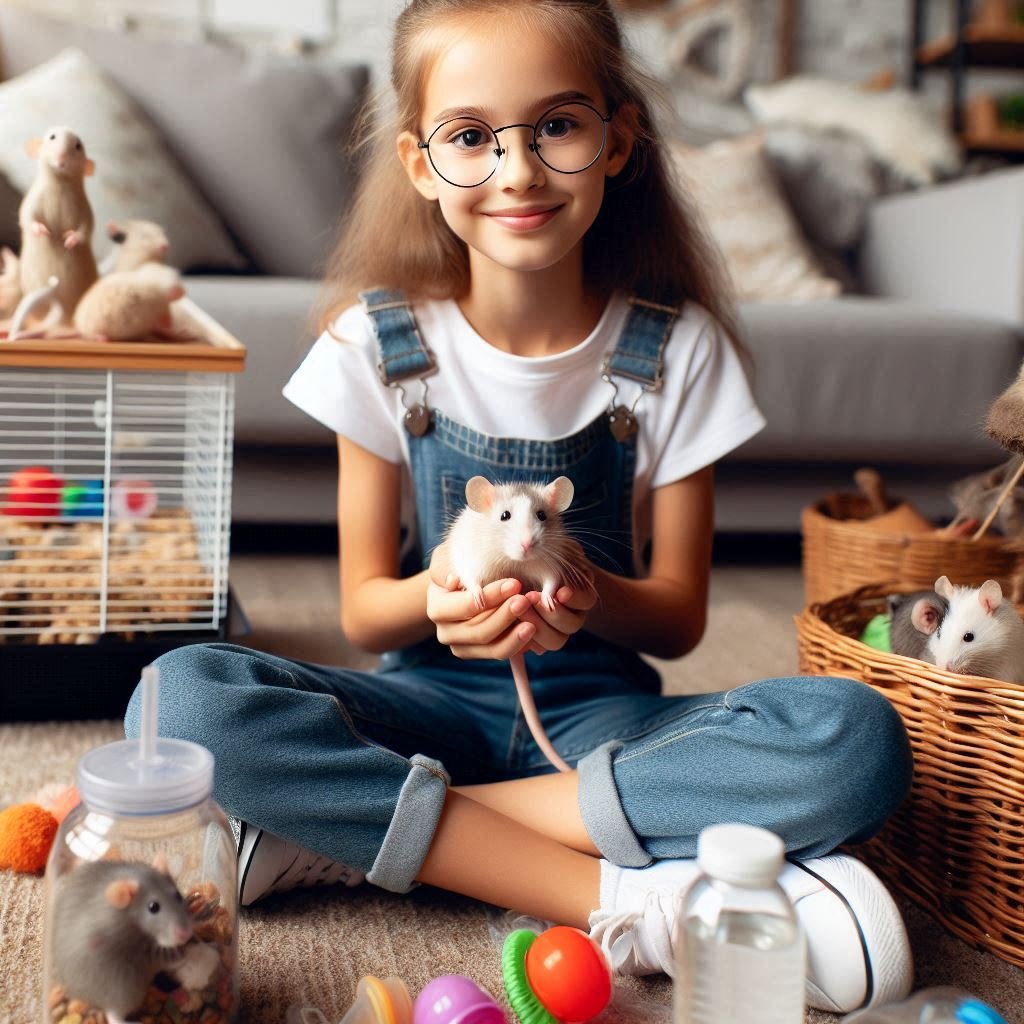Pet rats often get a bad rap, but in reality, they’re smart, affectionate, and make fantastic companions. If you’re considering adopting a pet rat, or you’ve just brought one home, you might be wondering: how do you properly care for a pet rat? Don’t worry, you’re in the right place! Pet rats are relatively low-maintenance, but they do have some specific needs to stay healthy and happy.
This guide will cover everything you need to know, from creating the perfect home for your rat to keeping them well-fed, healthy, and entertained.
1. Housing: Creating the Perfect Home for Your Rat
Rats are curious, active, and love to explore, so they need a comfortable and enriching environment. Unlike some small pets, rats are social and thrive in a space that allows them to exercise and interact with their surroundings.
Cage Size and Setup
- Cage size: The bigger, the better! A rat cage should be at least 24 inches long, 12 inches wide, and 18 inches high for two rats, but ideally, go larger. Rats love to climb, so a multi-level cage with platforms and ramps is ideal.
- Bar spacing: Ensure the bars are no more than 0.5 inches apart. Rats are escape artists, especially younger or smaller ones!
- Bedding: Avoid pine or cedar bedding, which can be harmful to rats. Opt for paper-based bedding, aspen, or fleece, which are safe and comfortable for your pets.
- Hiding spots: Rats love cozy, hidden spaces, so add hammocks, tubes, and small hideaways inside their cage.
Cleaning the Cage
Rats are relatively clean animals, but their cage still needs regular upkeep to avoid odors and keep them healthy.
- Spot clean: Every day, remove any wet bedding and wipe down any dirty areas.
- Deep clean: Once a week, thoroughly clean the entire cage. Replace the bedding and clean toys, ramps, and accessories with pet-safe cleaning products.
2. Companionship: Rats Need a Buddy
One of the most important aspects of caring for a pet rat is understanding that rats are highly social animals. Keeping a single rat can lead to loneliness and depression, so it’s best to keep them in pairs or small groups.
Best Rat Pairing:
- Same-sex pairs: Always keep rats of the same sex together unless you’re prepared to breed them. Two females or two males generally get along well, especially if they’re littermates or introduced properly.
- Introducing new rats: If you’re adding a new rat to your existing rat’s enclosure, introduce them gradually. Start with separate cages and supervised playtime, then gradually move to sharing the same space.
3. Diet: What to Feed Your Pet Rat
A balanced diet is key to keeping your rat healthy and active. Pet rats are omnivores, meaning they eat a variety of foods, including grains, vegetables, fruits, and proteins.
Staple Diet:
- Commercial rat food: High-quality commercial rat pellets or blocks should make up the majority of their diet. These foods are formulated to provide the necessary nutrients, like protein and fiber, that rats need.
- Fresh fruits and vegetables: Offer a variety of fresh produce every day, like:
- Leafy greens (spinach, kale)
- Carrots
- Broccoli
- Apples (without seeds)
- Berries
- Cucumbers
Occasional Treats:
- Healthy treats: Rats love treats, but moderation is key. Foods like cooked eggs, unsweetened cereal, or a small piece of cheese can be offered occasionally.
- Foods to avoid: Stay away from chocolate, citrus fruits, raw beans, and foods high in sugar or salt, as they can be toxic or unhealthy for rats.
Fresh Water:
Make sure your rats have access to clean, fresh water at all times. Use a water bottle with a sipper tube that attaches to the cage, as this will prevent contamination from bedding and food.
4. Exercise and Enrichment: Keeping Your Rat Entertained
Rats are curious creatures with sharp minds and lots of energy. Without enough mental and physical stimulation, they can become bored, leading to stress or destructive behavior.
Toys and Enrichment
- Chew toys: Rats’ teeth grow continuously, so they need plenty of things to chew on. Wooden blocks, cardboard tubes, and chew sticks are great options.
- Climbing structures: Set up hammocks, ropes, and ladders for them to explore and climb.
- Foraging activities: Hide food or treats around the cage or inside toys to engage their natural foraging instincts. Puzzle toys designed for small pets are excellent for keeping them mentally stimulated.
Out-of-Cage Playtime
Your rats need time outside of their cage to explore and interact with you. Set up a rat-safe play area where they can roam freely. Make sure the space is free of hazards like electrical wires or small objects they could swallow.
5. Health Care: Keeping Your Rat Healthy
Rats are generally hardy creatures, but like all pets, they can face health issues. The key is to stay vigilant and provide regular care to prevent common problems.
Common Health Issues:
- Respiratory infections: Rats are prone to respiratory problems, so if you notice signs like wheezing, labored breathing, or nasal discharge, take your rat to the vet.
- Tumors: Especially in older rats, benign or malignant tumors can form. If you notice any unusual lumps or bumps, consult your vet.
- Dental problems: Rats’ teeth grow continuously, so overgrown teeth can become a problem. Make sure your rats have plenty of chew toys to keep their teeth filed down naturally.
Vet Visits
Find a vet who specializes in exotic pets, as rats need a professional who is experienced with small animals. Schedule annual check-ups, and if you notice anything unusual, don’t wait—rats can decline quickly without proper treatment.
6. Socializing: Bonding with Your Pet Rat
Rats are surprisingly affectionate and love bonding with their owners. Building a relationship with your pet rat takes time and patience, but it’s extremely rewarding.
Tips for Bonding with Your Rat:
- Frequent handling: Handle your rats regularly so they get used to your scent and presence. Start slowly, offering treats from your hand and allowing them to explore you at their own pace.
- Trust training: Rats are smart and can learn tricks, like coming when called or climbing onto your shoulder. Use treats and positive reinforcement to build trust and create a fun learning environment.
- Lap time: Once your rats are comfortable with you, they’ll enjoy sitting on your lap or shoulder while you watch TV or relax. This is a great way to bond!
7. Grooming: Keeping Your Rat Clean
Rats are pretty clean animals and will groom themselves regularly, but there are still some grooming tasks that may require your help.
Grooming Tips:
- Nail trimming: If your rat’s nails get too long, they can become uncomfortable or even scratch you. You can trim them using a small animal nail clipper, or a vet can do it for you.
- Fur care: Rats don’t usually need baths, but if they get especially dirty, you can clean them with a damp cloth or give them a shallow bath with warm water. Make sure to dry them thoroughly afterward to prevent them from getting chilled.
- Odor control: Male rats (bucks) may have a stronger smell due to scent-marking behaviors. Keeping the cage clean will help manage this, and some pet owners opt to neuter their male rats to reduce the smell.
8. Handling and Safety: Picking Up and Holding Your Rat
Knowing how to handle your rat safely is important to prevent injury to both you and your pet. Rats are gentle, but they can be skittish, especially if they’re not used to being handled.
How to Safely Pick Up Your Rat:
- Scoop method: Always approach your rat slowly and gently. It’s best to scoop them up with both hands, supporting their body underneath. Avoid grabbing them by the tail, as this can be painful and cause injury.
- Support their weight: Once you’ve picked them up, keep them close to your body to make them feel secure. Rats love climbing onto your shoulder or sitting in your hands while they explore.
- Be calm: Rats can sense your energy. Stay calm and gentle when handling them, especially if they’re new or nervous.
Conclusion: Caring for a Pet Rat is Rewarding and Fun!
Pet rats are intelligent, social, and full of personality, making them fantastic pets for those who are ready to meet their needs. With proper housing, a healthy diet, plenty of social interaction, and regular health care, your rats will thrive and bring you years of joy.
Whether you’re teaching them tricks, watching them play in their cage, or bonding during lap time, rats make surprisingly affectionate and interactive companions. Take good care of them, and they’ll repay you with their adorable antics and loyal companionship.


